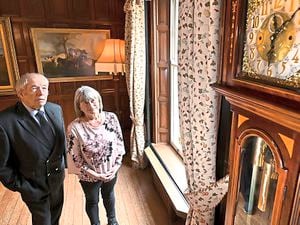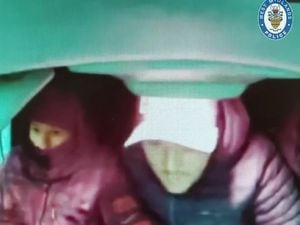Daring West Midlands Fire Service dogs are not to be sniffed at
Meet Ellie, Peppa and Kai – three sniffer dogs trained to find even the faintest traces of flammable liquids in buildings and outdoor areas they are completely unfamiliar with.
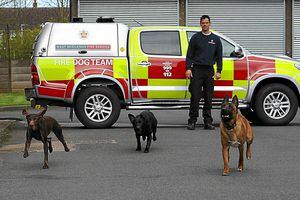
Together, these loveable mutts have been responsible for tracking down crucial evidence that has helped bring many a criminal to justice.
Wearing tiny boots to protect their paws from the heat residue, they are sent into burned-out buildings to find evidence of any of 12 flammable liquids – from petrol and diesel to white spirit and turpentine – even once the substances themselves have long since evaporated.
Fire investigations dog handler Matt Dixon has trained the dogs since they were puppies.
He said: "They are used primarily for finding traces of flammable liquid. The most common use is at a fire scene where we suspect arson.
"The dogs will help us find where the flammable liquid has been applied."
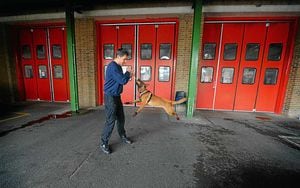
In April 2013, for example, Mohammed Inayat set his Birmingham house on fire in a so-called 'honour killing' plot, killing his wife and injuring his three daughters.
He denied the crime, but his guilt was proved after sniffer dogs found traces of petrol in several rooms of the house, as well as in a jug, the kitchen sink and a petrol can nearby, according to Mr Dixon.
Investigators
Mr Dixon explains that investigators were able to prove that Inayat decanted the petrol into the jug, splashed it around the house, and poured the final few drops down the sink, before setting fire to the house.
Inayat was found guilty of murder and arson and was jailed for 22 years.
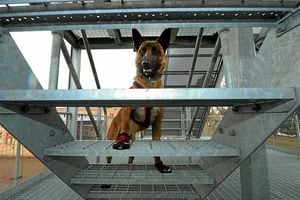
Mr Dixon said: "Without the evidence from the dog the petrol can wouldn't have been found and we probably wouldn't have picked up on the jug or the sink.
"It's impossible to say but the dogs' evidence certainly helps. Whether he would have got off without that evidence is anyone's guess."
As well as finding evidence to convict criminals, the dogs can be used to rule out suspicious circumstances and arson.
In other cases, evidence found by the dogs has led police to a suspect.
At the very least, it can help paint a clear picture of what happened at a crime scene.
Mr Dixon said: "Quite often we will find receptacles that will give us fingerprints, which will then lead us to a suspect and their house."
He added: "Another example is petrol through a letterbox. The dog will do a search at a house and if they find traces on a bed upstairs it looks more like an attack from inside, rather than outside.
"Then you can start to think along the lines of whoever has done it had legitimate access." The whole training process takes between six and nine months. Only then are the dogs ready for real investigations.
And although they are taught to find flammable liquids, all they are really after are tennis balls.
"The training is all play-based," said Mr Dixon. "Everything they do is a game.
"You train them using tennis balls so you get the dogs massively focused on the tennis ball and willing to search around for it. Then you reward the dog with one when they find the petrol, or whatever you want them to look for."
Some of the training takes place in mock buildings, or training towers, as they are called. The one at Fallings Park Fire Station in Wolverhampton is three floors high, with all of the walls and floors made of a metal mesh that the dog can see through.
"From a dog's point of view it's a very alien environment," says Mr Dixon.
"From a very young age I take my dogs to places that are a bit weird. I need to be comfortable they are going to be happy with whatever environment I put them in.
"If I need to take them up on a hydraulic platform, for example, they need to be happy with that."
Mr Dixon has held his role for more than seven years.
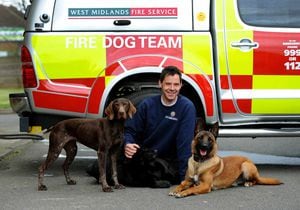
He spends most of his time in the West Midlands, but also covers jobs across the country, wherever he is needed, as there are only around 15 fire investigation dog handling teams in the UK.
German short-haired shepherd Peppa, aged five, and Belgian shepherd Malinois, 15 months, undertake around 100 jobs a year, as did Springador Ellie, 12, before she retired. When they get time to relax, they enjoy being fawned over by schoolchildren during their regular assembly presentations, where the pupils learn about what the dogs do and the impact of arson.
But after a hard day's work, the precious pooches love nothing more than chasing tennis balls back at home with Mr Dixon – even Ellie, who hung up her tiny fire dog boots six months ago, after seven years' service.


